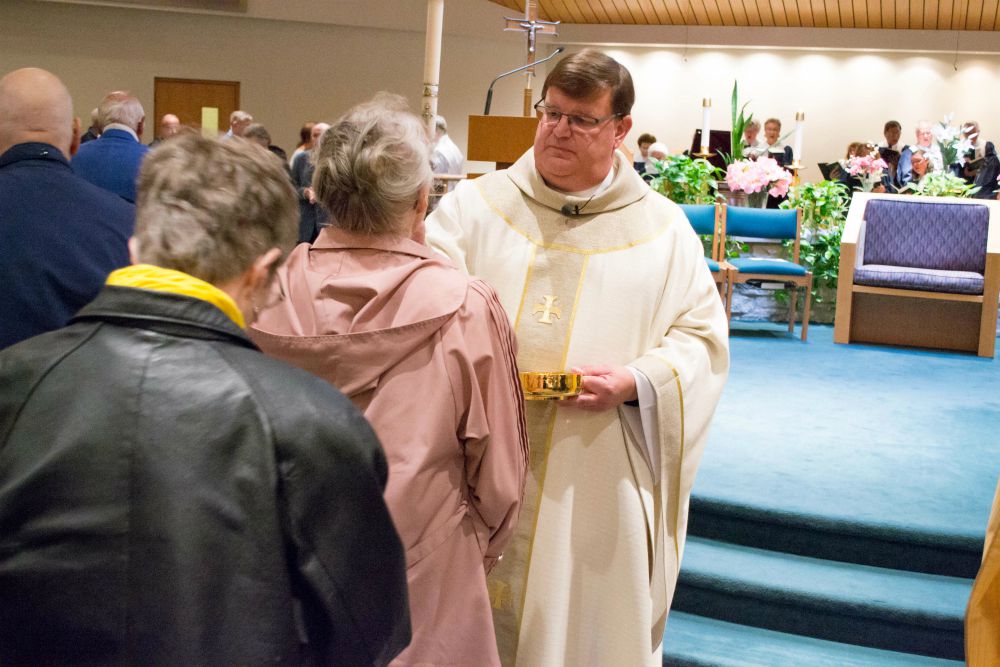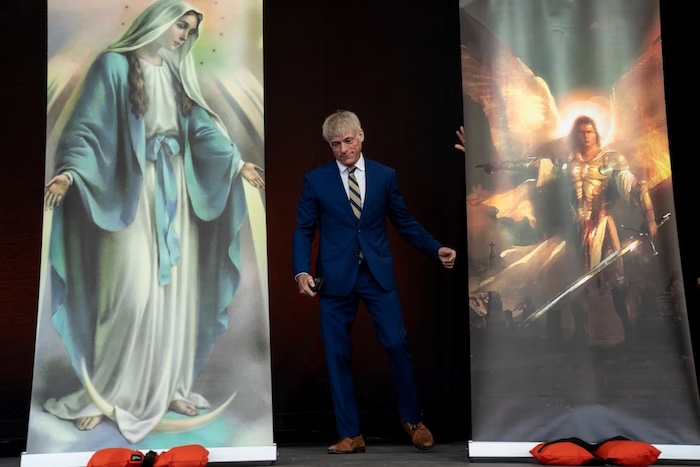— The pope used homophobic slang and cautioned prelates about admitting gay men into seminaries. But ordination has also long been a refuge for gay faithful.

by Emma Bubola and Elisabetta Povoledo
When reports spread that Pope Francis had used an offensive anti-gay slur while speaking to Italian bishops at a conference last month, many Catholics were both shocked and baffled. How could a pope known for his openness to and acceptance of L.G.B.T.Q. people use homophobic slang and caution prelates about admitting gay men into seminaries?
But the question, and the apparent inconsistency in Francis’ messaging, reflect the deep contradictions and tensions that underlie the Roman Catholic Church’s and Francis’ relationship to homosexuality.
The church holds that “homosexual tendencies” are “intrinsically disordered.” When it comes to ordination, the church’s guidelines state that people with “deep-seated” gay tendencies should not become priests.
Yet ordination has also long been a refuge of sorts for homosexual Catholic men, according to researchers and priests, who say that at least thousands of clergymen are gay, though only a few are public about their sexual orientation because of the stigma it still carries in the church.
While in the past all of these contradictions were muffled by an aura of taboo, Francis’ recent off-the-cuff comments have thrown them into the open.
“The pope lifted the veil,” said Francesco Lepore, a former employee in the Vatican’s Latin department who left the church, came out as gay and became an activist.

The issue is layered by longstanding prejudices, and the sexual abuse crisis that emerged two decades ago inflamed accusations by some bishops and conservative church media outlets that homosexuality was to blame, even though studies have repeatedly found there to be no connection between being gay and abusing minors.
Despite evolutions in society, and Francis’ embrace of a more progressive approach, church teachings still describe homosexuality as a deviance and have enshrined that view in regulations and restrictions that critics say perpetuate a widespread homophobic outlook and fuel tensions.
“Until they change the law, as long as homosexuality is viewed as a deviance and an illness, nothing will change under St. Peter’s cupola,” said Luciano Tirinnanzi, who wrote a book about L.G.B.T.Q. people and the church.
Yet the presence of gay clergy has been a constant throughout history. St. Peter Damian, an 11th-century monk, fought against “sins of sodomy” in the church. Dante Alighieri punished gay clerics by plunging them into hell in his “Divine Comedy,” and there are documented cases dating to the 16th century of prelates who were accused of performing homosexual acts and killed. (Records of priests, and even cardinals and popes, who were unchaste with women and even had children are also abundant.)
Academics and prelates who promote L.G.B.T.Q. rights said that for gay Catholic men, becoming a priest was long viewed as a way to neutralize and overcome the stigma once associated with their sexual orientation, and perhaps even suppress it through celibacy.
“A large quantity of young religious men with homosexual tendencies looked for the sublimation of celibacy,” said Alberto Melloni, an Italian church historian.
It is hard to know exactly how many priests are gay, as there are no trustworthy statistics, but in the United States, gay men probably make up at least 30 to 40 percent of the American Catholic clergy, according to dozens of estimates from researchers and gay priests gathered in a 2019 investigation by The New York Times. Some priests and activists say the number is closer to 75 percent.

Last month, Francis said that there was already too much gayness, though he used a pejorative to describe it, according to two bishops who attended the conference and confirmed the Italian media reports that triggered an apology from the Vatican. Asked about Francis’ usage of a slur, bishops blamed it on Francis’ relaxed and colorful conversation style.
“When there are official speeches, he studies, but when he speaks off the cuff, a word that is not entirely ideal can also slip out,” said Luigi Mansi, the bishop of the Italian city of Andria. Bishop Francesco Savino, a vice president for the Italian bishops’ conference, blamed it on the fact that Francis is not a native Italian speaker. “When he talks, he uses terms that are a mix of Spanish, Argentine, Italian,” he said.
Yet despite the surprising use of the slur, it is not the first time Francis has reflected the church’s opposition to having homosexual men enter the ministry.
While he has acknowledged that many homosexual priests are good and holy, Francis has repeatedly expressed concern that homosexual candidates for priesthood can end up having relationships and living double lives.
In another closed-door session in 2018, reported by the Italian news media, he said men with “deep-rooted” homosexual tendencies should not be allowed to enter into seminaries.
Two years earlier, the pope greenlighted a document on priestly vocations that stated just the same, reprising a 2005 document approved by Benedict XVI.
The clergy has interpreted these instructions in different ways. The church states that “homosexual men should not be admitted to the orders,” said Piero Delbosco, the bishop of Cuneo, Italy, adding that there could be some leeway to determine whether a candidate might overcome homosexual tendencies.
Others, like Monsignor Mansi, say that “the church doesn’t say that gay people can’t be ordained.” But, he added, the church believes ordination should be avoided because it is harder for gay men to “observe and live celibate for their entire lives.” Experts and prelates who promote L.G.B.T.Q. rights strongly deny this claim.
“There are three ways that that’s being interpreted,” said the Rev. James Martin, a high-profile supporter of making the church more welcoming to gay Catholics. It is either no to homosexual seminarians, no to people who cannot maintain celibacy or no to anyone for whom that is the most important thing in their life, he said.
Francis’ messaging just added to the confusion, some said.
“He needs to clarify his message a little better because it does get confusing,” said Mr. DeBernardo. “It doesn’t help the situation. It problematizes the situation.”
>The confusion, critics said, blurs the line between celibacy and homosexuality, shifting the focus from a legitimate preoccupation with priests who are not chaste to a blanket stigmatization of all gay clergy. This, they say, can cause some potentially celibate gay men to be barred from ordination, and many more to simply hide their sexuality.
The Italian bishops’ conference has adopted new rules that deal specifically with ordaining gay priests in Italy, said Monsignor Savino. The rules, which are awaiting approval from the Vatican, are not yet public.

Pope Francis’ use of the slur was prompted by a question from an Italian bishop about the issue, bishops said.
The topic of homosexuality, Monsignor Savino said, is “very debated” at the moment, as bishops with a more “pragmatic” and “dynamic” approach would like to update the rules. But progressive pushes inside the church often face blowback and prejudice.
Francis must play a delicate balancing act between a message of openness and inclusivity while recognizing the more conservative sensibilities of the church that remain firmly anti-gay.
When Francis last year allowed priests to bless same-sex couples, some bishops in conservative corners of the church pushed back. To placate them, the Vatican issued a statement that said that “local culture” should be taken into account when it came to applying the declaration, but that it would remain church policy.
When interviewed on this topic, some bishops referred to homosexuality as a “pathological” condition, a “problem” or used expressions like “normal sexuality” to refer to heterosexuality as opposed to homosexuality.
Even the church’s guidelines referring to “deep-seated homosexual tendencies” are “offensive,” Mr. Lepore said, because they convey the message that homosexuality can be transitory, healed and overcome.
He added that Francis’ effective messages of openness would inevitably be undercut if church teachings and a large parts of the clergy continued to consider homosexuality a disorder and not a sexual orientation.
“The difficulties, the rifts that the church lives,” he said. “It all comes from there.”
Complete Article ↪HERE↩!





